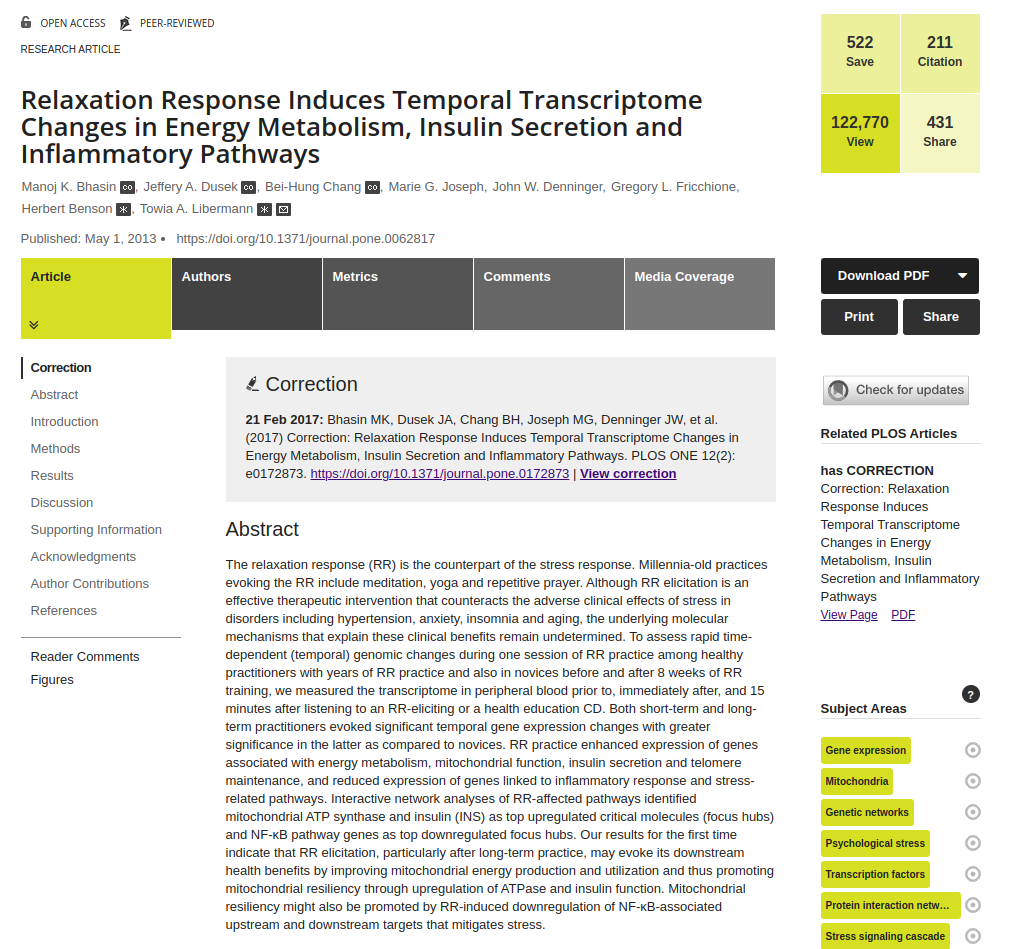The relaxation response (RR) is the counterpart of the stress response. Millennia-old practices evoking the RR include meditation, yoga and repetitive prayer. Although RR elicitation is an effective therapeutic intervention that counteracts the adverse clinical effects of stress in disorders including hypertension, anxiety, insomnia and aging, the underlying molecular mechanisms that explain these clinical benefits remain undetermined. To assess rapid time-dependent (temporal) genomic changes during one session of RR practice among healthy practitioners with years of RR practice and also in novices before and after 8 weeks of RR training, we measured the transcriptome in peripheral blood prior to, immediately after, and 15 minutes after listening to an RR-eliciting or a health education CD. Both short-term and long-term practitioners evoked significant temporal gene expression changes with greater significance in the latter as compared to novices. RR practice enhanced expression of genes associated with energy metabolism, mitochondrial function, insulin secretion and telomere maintenance, and reduced expression of genes linked to inflammatory response and stress-related pathways. Interactive network analyses of RR-affected pathways identified mitochondrial ATP synthase and insulin (INS) as top upregulated critical molecules (focus hubs) and NF-κB pathway genes as top downregulated focus hubs. Our results for the first time indicate that RR elicitation, particularly after long-term practice, may evoke its downstream health benefits by improving mitochondrial energy production and utilization and thus promoting mitochondrial resiliency through upregulation of ATPase and insulin function. Mitochondrial resiliency might also be promoted by RR-induced downregulation of NF-κB-associated upstream and downstream targets that mitigates stress.
Relaxation Response Induces Temporal Transcriptome Changes in Energy Metabolism, Insulin Secretion and Inflammatory Pathways
Publication
PLOS ONE
Abstract
Web and Email Links
Related Listings
Journal
Radiology
Immediately before they underwent femoral angiography, 45 patients were given one of three types of audiotapes: a relaxation response tape recorded for this study, a tape of contemporary instrumental music, or a blank tape. All patients were instructed to listen to their audiotape during the entire angiographic procedure. Each audiotape was played through earphones. Radiologists were not told the group assignment or tape contents. The patients given the audiotape with instructions to […]
Journal
Journal of Clinical Medicine
Stress is a term used to define the body’s physiological and psychological reactions to circumstances that require behavioral adjustment [1,2,3], and the relaxation response is a psychophysiological state that is opposite to that of the stress or fight–flight response [4]. A variety of mind/body techniques can be used to elicit a relaxation response and achieve the therapeutic effects associated with reduced blood pressure. For example, researchers at the Cochrane Review [5] investiga […]
Journal
The Lancet
A wakeful hypometabolic state may be induced by simple, non-cultic mental techniques or by traditional meditational practices. The hypometabolic state seems to represent an integrated hypothalamic response ("relaxation response") which is consistent with a state of decreased sympathetic-nervous-system activity. A prospective investigation was designed to test whether regular elicitation of the relaxation response might lower blood-pressures in hypertensive patients who were maintained […]

